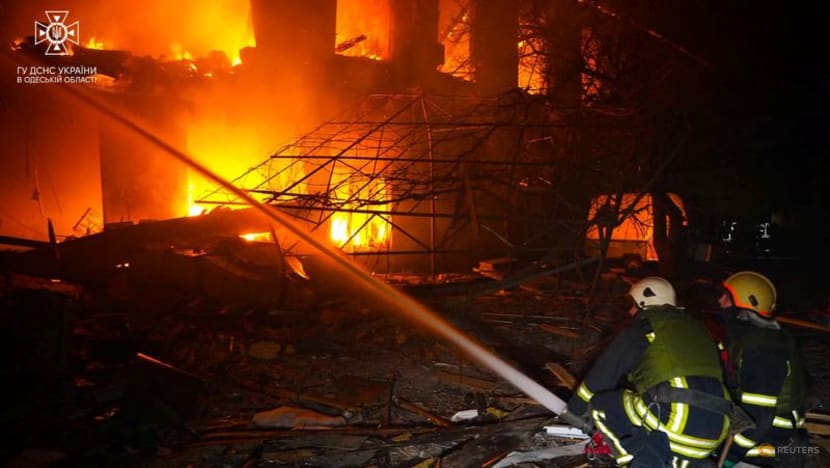Commentary: Two years on, where is Russia’s war on Ukraine going?
Russian defences have proven more sophisticated than expected, while the West has been unable to normalise assistance to Ukraine, says Pusan National University’s Robert Kelly.

Firefighters work at a site of Russian drone and missile strikes, amid Russia's attack on Ukraine, in Odesa, Ukraine on Feb 23, 2024. (Photo: Press service of the State Emergency Service of Ukraine in Odesa region/Handout via Reuters)

This audio is generated by an AI tool.
BUSAN, South Korea: The war in Ukraine has reached its second anniversary. On Feb 24, 2022, Russian President Vladimir Putin sent his army into Ukraine in violation of repeated Russian assurances against invasion.
The war was to last a week or two. Mr Putin anticipated a “blitzkrieg” - a rapid victory which would present the West with a fait accompli. Before the West had time to react, the war would be over, and the West would have to adjust to new facts on the ground.
This quickly went awry. The Russian army bogged down in the outskirts of the Ukrainian capital and had to withdraw. In the east it penetrated along a broad front, but not deeply. It only took about 20 per cent of Ukrainian territory. Importantly, it did not reach the Dnipro River, which bisects Ukraine, and therefore could not approach North Atlantic Treaty Organization (NATO) territory.
Later in 2022, Ukraine counterattacked, rolling Russia out of about half of its conquests. In 2023, Ukraine tried a much larger offensive. This failed badly, resulting in a stalemate by the onset of winter. Russian defences were far more sophisticated than analysts had expected after its poor defensive showing in 2022. In the last six months, the frontlines have hardly moved.
WAR OF ATTRITION SHIFTING IN RUSSIA’S FAVOUR
Last year in a CNA commentary, I argued that Russia needed to end the war in 2023. I was sceptical that Russia could win a long war of attrition with Ukraine. The West has broadly supported Ukraine, and its combined economic weight is vastly greater than Russia’s gross domestic product. China and the Global South, I imagined, would keep their distance from Russia, given their great need for Western market access.
Both of these conjectures have broken against the Ukrainians. First, Russia has proven better at resisting Western sanctions than anticipated. The war is hurting it economically, but not as much as expected.
GDP growth is sluggish, but earlier predictions of contraction have not borne out. China, India and other players in the Global South have continued to trade with Russia.
Much Russian public investment is directed toward military production now. This “military Keynesianism” will drag down medium-term growth across the economy, but Mr Putin’s repressive apparatus can contain the consequent public unhappiness.
The war is worsening Russia’s long-term economic problems - its brain drain to the West, trade isolation, severance from Western technologies - but these will not impact it on a timescale early enough to help Ukraine win.
Second, and perhaps more importantly, the West continues to dither on aid to Ukraine. The aid pipeline should, by now, be smooth and coordinated - as the United States aid pipeline to Afghans fighting the Soviet Union in the 1980s was by the mid-80s.
Instead, Western aid packages continue to arrive in piecemeal, erratic fashion in amounts too small for planning major initiatives. Two years into the war, big donors, such as Germany, France and the US, continue to have protracted domestic debates over every new package, slowing down delivery and creating much uncertainty in Ukraine on what will be delivered and when.
Perhaps most surprising is the rise of pro-Russia sentiment in right wing groups of the West, most obviously supporters of former US president Donald Trump. These “populists” have blossomed into a major domestic constraint on further aid. Indeed, they may even seek a Russian victory, because it suits their anti-NATO, nativistic beliefs.
Given the West’s 50-year struggle against the Soviet Union, this rapid pro-Putin pivot among Western conservatives has been remarkable. The upshot is that even though the West has, easily, the resources to sponsor Ukraine for years, it lacks the political resolve.
Indeed, if Mr Trump returns to the US presidency in the fall, he will likely cut off Ukraine aid completely, which will support a Russian victory.
THE CURRENT STALEMATE
The outcome of these trends is the stalemate of the past twelve months. Russia learned from its defensive errors in 2022 and fought better in 2023 against the Ukrainian summer offensive. Mr Putin is putting the Russian economy on a war footing, while the West has proven unable to normalise and regularise assistance to Ukraine.
Ukraine has some advantages. Its Western technologies are battlefield-superior to the Russian elements facing them. Russia has lost so many tanks, for example, that it is now using armoured vehicles from the 1960s. And Ukraine has superior morale. Polls continue to show that Ukrainians want to fight on.
But Russia’s advantages of mass are substantial. It has mobilised its economy in ways that Ukraine and the West have not. Ukraine still, for example, is using a volunteer military rather than drafting its younger population. Russia has also dug in deeply along the line of contact. Breaching those defences will take a great deal more and better Western weapons.
Ukraine’s next steps are likely full mobilisation and preparation for an insurgency in the case of battlefield defeat. It must generate combat power at home if the West is going to partially abandon it. A larger infantry force from the draft is an obvious step, as is expanding Ukraine’s own defence industrial base, which is already happening.
If Western aid dries up completely and Russia breaks the current stalemate, Ukraine could - and likely will - launch an insurgency against Russian control, much as Afghans did against the Soviets in the 1980s.
But if this year concludes with no major shift in the lines, Ukraine might consider ending the war - trading its conquered territory for admission to the European Union and NATO to deter Russia from attacking again.
Robert Kelly (@Robert_E_Kelly) is a professor of political science at Pusan National University.
















